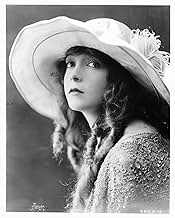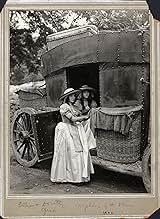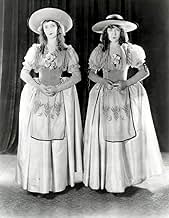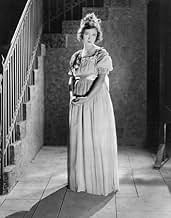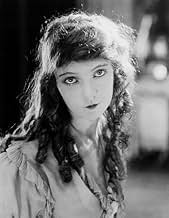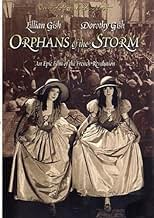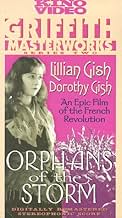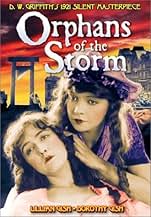Em meio às turbulências da Revolução Francesa, duas irmãs órfãs encontram a desgraça e o amor.Em meio às turbulências da Revolução Francesa, duas irmãs órfãs encontram a desgraça e o amor.Em meio às turbulências da Revolução Francesa, duas irmãs órfãs encontram a desgraça e o amor.
- Direção
- Roteiristas
- Artistas
- Prêmios
- 1 vitória no total
- Direção
- Roteiristas
- Elenco e equipe completos
- Produção, bilheteria e muito mais no IMDbPro
Avaliações em destaque
Orphans of the Storm is rather lazily-written, full of one-dimensional characters, predictable situations, and sudden coincidences leaping over gaps in the plot, as two sisters, one of them blind, lose each other, find each other, then lose each other again amid the chaos of the French Revolution. However, it's (just about) possible to overlook a bad story so long as it's well told. Unfortunately, Griffith appears to be following the trend of having more and longer title cards, explaining every point and feeding us superficial lines of dialogue, where the action alone should tell us what is going on. In some scenes, such as those where Dorothy Gish's blindness is brought up, we get the worst of both worlds, having not only the point-labouring title cards, but also exaggerated pantomiming, with characters pointing emphatically at both eyes.
Griffith should have known that all his best moments were wordless and understated. Thankfully, he has not forgotten how to direct a good love scene, and those between Joseph Schildkraut and Lillian Gish are particularly effective, framed plainly in a series of close-ups, barely moving their faces but conveying a world of emotion. This was Schildkraut's first American picture, and he is one of the most pleasingly natural and convincing lead men Griffith had worked with thus far. With his fine, sharp features he was also appropriately handsome, although a few films later he would play Judas in King of Kings, and subsequently became a bit typecast. As for Gish, she is far more satisfying here in one of her serene and sensible roles, as opposed to the hysterical girly parts she was increasingly given. The other standout in this cast is Monte Blue as Danton, whipping a crowd into a frenzy without once resorting to hamminess.
It was a long-established rule that every major Griffith picture had to feature a battle somewhere in the middle, and end with a climactic ride-to-the-rescue. By 1921 these action sequences were becoming a trifle uninspired. The battle between revolutionaries and soldiers has a great build-up, but then resorts to bland god-shots, making the moment suddenly seem very cold. The finale is one of Griffith's least engaging, I think because while the ride itself is excitingly shot and edited, the business at the guillotine is just a lot of faffing around, a far cry from Bobby Haron's haunting walk to the scaffold in Intolerance.
In spite of all this, Orphans of the Storm – like every Griffith feature I have seen – does have its absolutely divine moments. There's a very dynamic sense of rhythm to the scene at the ball and the later celebration of the victorious revolutionaries. The reunion of Schildkraut and Lillian Gish is both powerful and sensitive. Griffith may have been beginning to slip, but at least he was failing beautifully.
Lillian Gish is Henriette Girard and her sister Dorothy plays her "Sister" Louise. The amazing Joseph Schildkraut plays de Vaudrey, a nobleman who truly is noble. The "storm" in the title refers to the French Revolution, which is the background this story of family and romantic love plays itself upon.
As usual, Lillian Gish is wonderful in her role as the devoted sister Henriette; but it is Dorothy Gish as blind sister Louise who is truly the star of the film. Her performance drips with the pathos, pain, and longing that most people associate with her older sister. Schildkraut shines in this, his first Hollywood film role.
The frequent ridiculous scenes (Danton running to save Henriette from the executioner's blade?) and length of the film will turn most modern viewers off; but those who have a love of history, epic spectacle, and the timeless beauty of the Gish sisters will enjoy "Orphans of the Storm".
DOROTHY GISH and LILLIAN GISH are the sisters, with Dorothy as the blind waif who is separated from her sister when an overly amorous nobleman orders Lillian to be brought to his orgy. From there on, the Dickensian plot becomes thicker and thicker as the girls suffer one indignity after another in order to survive.
LUCILLE LaVERNE is the old hag (she later was the model for Disney's Wicked Witch in "Snow White"), a harridan who makes Dorothy a beggar in the streets. "You'll shiver better without a shawl," is one of her immortal lines.
Joseph SCHILDKRAUT is very impressive in an early American screen role, demonstrating charm and skill of the kind that would land him important parts in future costume films like "Marie Antoinette." MONTE BLUE is Danton, a man who meets LILLIAN GISH early in the story and later becomes the defender who saves her and Schildkraut from the guillotine.
It's all very melodramatic, the acting ranging from overdone to wildly overdone. Griffith was never subtle in asking his performers to give it their all. Excessive wringing of hands, eye-rolling to show anguish, fierce looks to show hatred, etc. may cause unintended chuckles when viewed by today's audiences, but there is never any letdown in the telling of a compelling story using the French Revolution as rich background material for a tale of villainy and heroism.
A fascinating silent film with an appropriate film score added to give the story even more force and flavor.
Summing up: Overlong drama, but compelling from the start to the feverishly melodramatic end.
Exquisite close-ups of Lillian Gish are touching and lend poignant charm to her performance.
As a long-time maven of silent films, I have no problem placing myself in that era and enjoying these movies on their own terms. Much has changed since those days, and most folks simply cannot appreciate the simplicity AND complexity of photoplays without words.
This film is magnificent and entertaining. I am not a fan of most "period pieces", but this transcends the typical fare. Check it out.
But Griffith's vision of the French Revolution is naive,to put it mildly.He was not apparently aware that the 1789 events were mainly a bourgeois move,and the poor were only a tool.The dichotomy Good Danton/Wicked Robespierre should make people who are looking for a sort of historical accuracy have a look at Wajda"s "Danton"(with G.Depardieu,in the eighties).
Forget history and you have a two-hour and a half silent movie with never a dull moment.Griffith is a wonderful storyteller,who had a great respect for his audience.Some sequences are still impressive today:the aristocratic orgy,when the Poor are starving at the gates of the palace is far from D'Ennery's timid depiction of the scene in the book;Lillian Gish,a wonderful actress who 'd been part of the cinema till the eighties,is so powerful in her part of the abducted maiden Henriette we can almost hear her when she screams out of despair:"is there a man of honor among you?Louise and the shrew who got her under her thumb begging in front of the cathedral as the snow is falling is a splendid picture,recalling a painter's work;even if Danton's coming to the rescue of a soon-to-be guillotined Henriette is thoroughly implausible,we cannot help but admire the director's maestria.
Few silent movies have stood the test of time as well as this one.
Você sabia?
- CuriosidadesWilliam J. Walsh, an extra playing a soldier, was killed on set when a prop rifle he was leaning on went off by accident; although the weapon was loaded with a blank cartridge, the wadding from a blank fired at point-blank range is capable of inflicting serious injury or death.
- Erros de gravaçãoWhen the Bastille is taken, the prisoners are freed. There are many of them. In reality, only seven prisoners were freed during the taking of the Bastille.
- Citações
Title Card: [Opening lines] TIME, - Before and during the French Revolution. Our story is of two little orphans who suffer first through the tyranny - selfishness - of Kingly bosses, nobles and aristocrats. After the King's Government falls they suffer with the rest of the people as much through the new Government, established by the pussy-footing Robespierre through Anarchy and Bolshevism. Strange that both these evil rulers were otherwise highly moral men except that they saw evil in all who did not THINK AS THEY DID. The lesson - the French Revolution RIGHTLY overthrew a BAD government. But we in America should be careful lest we with a GOOD government mistake fanatics for leaders and exchange our decent law and order for Anarchy and Bolshevism.
- Cenas durante ou pós-créditosThe starring Gish sisters are not listed in the opening credits. They are introduced on title cards as "Louise--Miss Dorothy Gish" and "Henriette--Miss Lillian Gish."
- ConexõesEdited into O Capital no Século XXI (2019)
Principais escolhas
- How long is Orphans of the Storm?Fornecido pela Alexa
Detalhes
- Data de lançamento
- País de origem
- Idioma
- Também conhecido como
- As Duas Órfãs
- Locações de filme
- Mamaroneck, Nova Iorque, EUA(D.W. Griffith: Father of Film)
- Empresa de produção
- Consulte mais créditos da empresa na IMDbPro
Bilheteria
- Orçamento
- US$ 1.000.000 (estimativa)
- Tempo de duração
- 2 h 30 min(150 min)
- Mixagem de som
- Proporção
- 1.33 : 1


